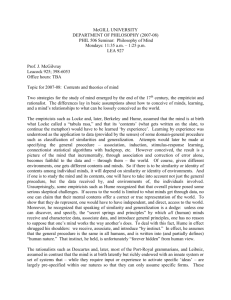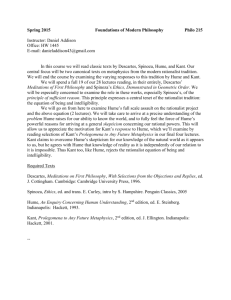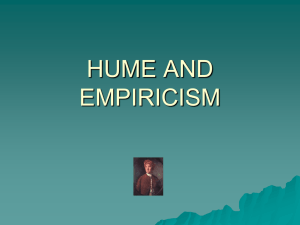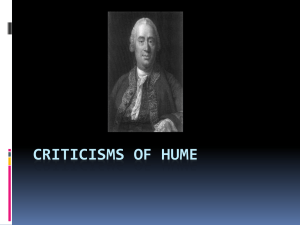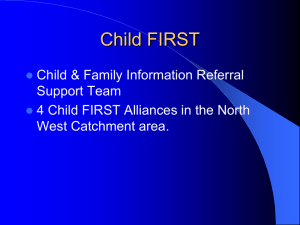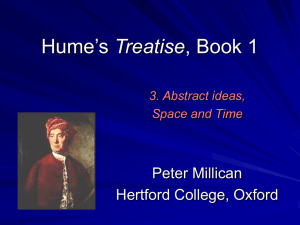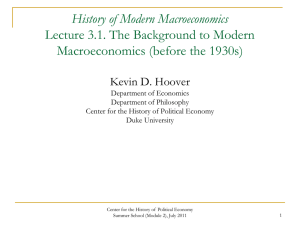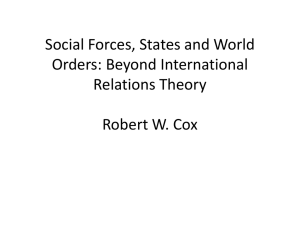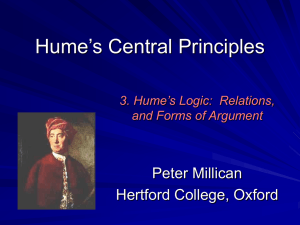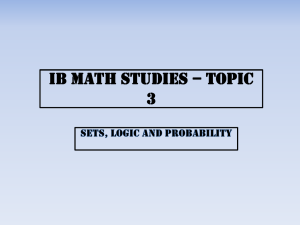Empiricism Part II: Hume
advertisement
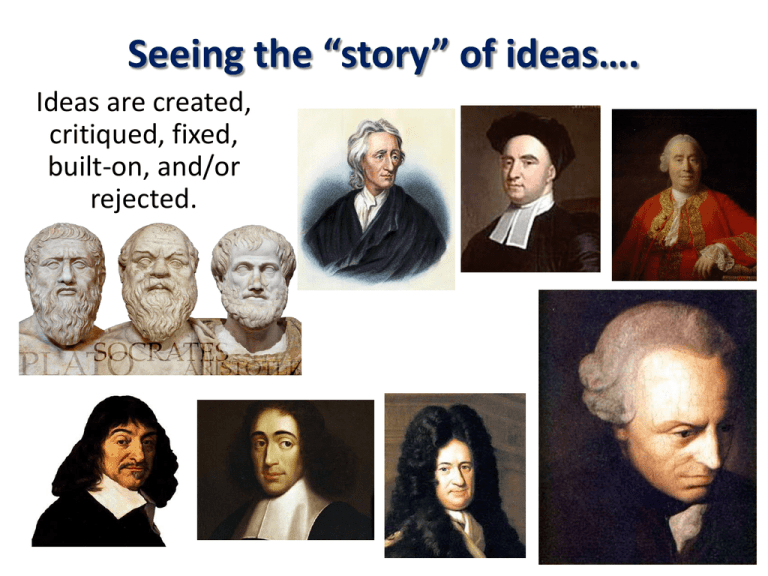
Seeing the “story” of ideas…. Ideas are created, critiqued, fixed, built-on, and/or rejected. Empiricism Part II: David Hume 1711-1776 Pushing Philosophy to a Point of Crisis Challenging Leibniz Analytic propositions (a priori): – Negation is contradiction. – True by definition. – Necessarily true. Hume: Okay, but these are tautologies that tell us NOTHING about the world. Hume: These tell us only about the relations of ideas. Bill will win the election or he will not win the election. If Bush was president for at least four days, then he was president for more than three days. 2+2= ½(8) & (2x2) & (68-64) & 22 Challenging Locke Synthetic propositions (a posteriori). – Derived from “sense data” and/or “sensations” that cause awareness & ideas. – Not necessarily true (can be false). Hmmmm….but Substance X causes some experience of sense data Y? Where’s the cause? First X, then Y….so always X, then Y? Does Y necessarily have to follow X? Causality vs. Seriality. Psychological expectation vs. fact. Continuing the Challenge on Locke’s Primary & Secondary Qualities If causation is suspect, how can we say some unidentifiable “substance” causes experience of sense data? There may be a “commonsense” experience of causation, but that doesn’t mean there is justification for the belief causation. So if we can’t say our sense data experience is caused by substance, how can we say we have knowledge of the world? Challenging Berkeley Hume: Analytic propositions have meaning (but are philosophically trivial). Hume: Synthetic propositions have meaning if they can be traced to sense data but are suspect (merely reports of psychological states?) Hume: Propositions that are neither analytic nor synthetic are “nonsense.” • God exists. Analytic? Synthetic? Challenging Descartes “I think; therefore, I am.” What are “you” thinking about if you cut out all sense data and all emotions and ideas? What is the “self” that thinks? Hume’s Accomplishment Belief in self, world, God, and causality are unfounded. Human life may be incompatible with rationality. At this point…. Which theory of knowledge, rationalism or empiricism, best captures the phenomena of knowing and knowledge? Are the “problem of substance” and the “problem of self” and the “problem of causality” real problems? Which theory of knowledge seems to offer the best prospects for rich experiences? Do Descartes, Locke, Berkeley, and Hume help or confuse us? Rationalist or Empiricist? The teacher is a midwife of ideas who helps students bring to birth the ideas latent within their minds. Rationalist or Empiricist? The mind is like a rubber band that encompasses the information that it acquires from the world. Hence, the job of a teacher is to stretch students’ minds so they can accommodate larger amounts of data. Rationalist or Empiricist? The students’ minds contain seeds of understanding. The teacher is merely a gardner who prepares the soil and provides it with nourishment so that the seeds can grow and produce fruit. Rationalist or Empiricist? The teacher is a lamplighter who illuminates the students’ minds so that the truth will shine forth. Rationalist or Empiricist? The mind is like a copy machine that reproduces images of the data it has scanned from the external world. Rationalist or Empiricist? The teacher is a tour guide who leads the students into new and unfamiliar territory. Rationalist or Empiricist? The mind is like a window that provides access to the outside world. Ignorance, prejudice, and dogmatism are like a haze or obstacles that the teacher must remove in order for the light of truth to shine through the window of the intellect. Rationalist or Empiricist? The mind is like a computer. Its capabilities are only as good as the data it receives. Rationalist or Empiricist? The mind is like a computer. Without some built-in internal content such as logic circuits and an operating system, it is incapable of processing external data. Rationalism vs. Empiricism What does it mean to be a “moral” person? Does morality exist independent of human thought or emotion? How do we learn to be moral? Why do different cultures seem to share basic moral principles—e.g. infanticide is wrong, lying is wrong, etc.
